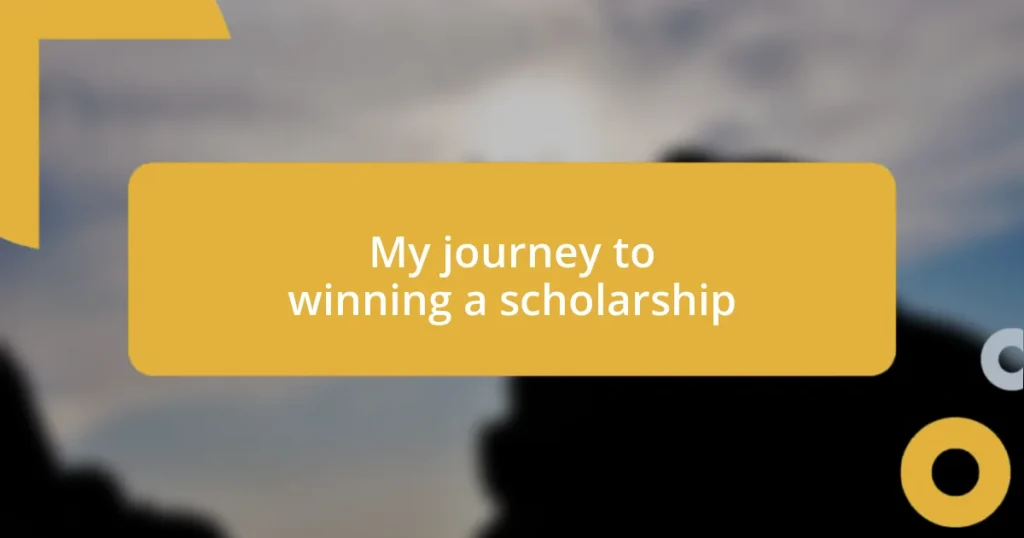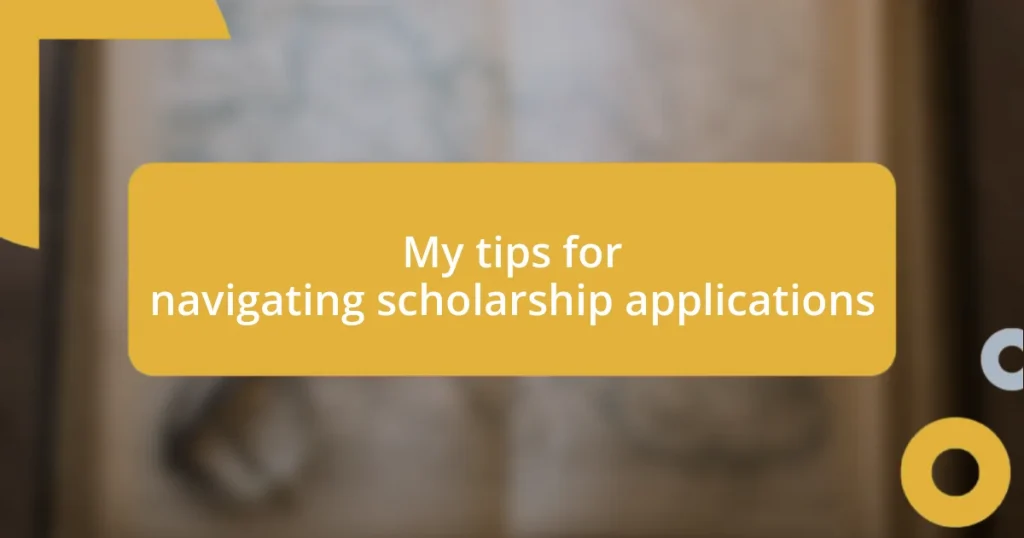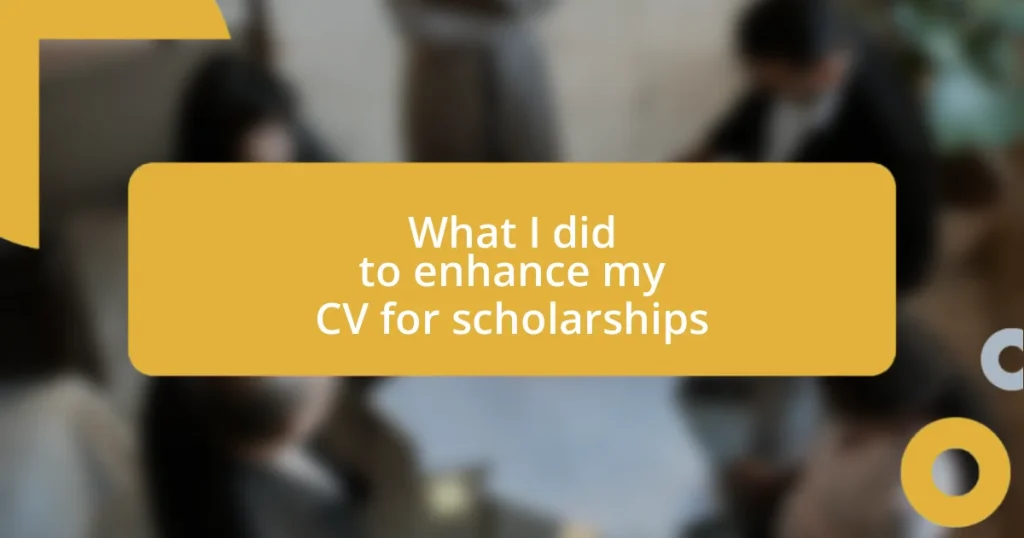Key takeaways:
- Scholarships provide both financial support and a sense of belonging, connecting applicants with mentors and peers who share their backgrounds.
- Preparing compelling application materials, including a personal statement and recommendation letters, is crucial for standing out to scholarship committees.
- Managing scholarship responsibilities involves balancing academics with engagement in community service and maintaining communication with scholarship providers.
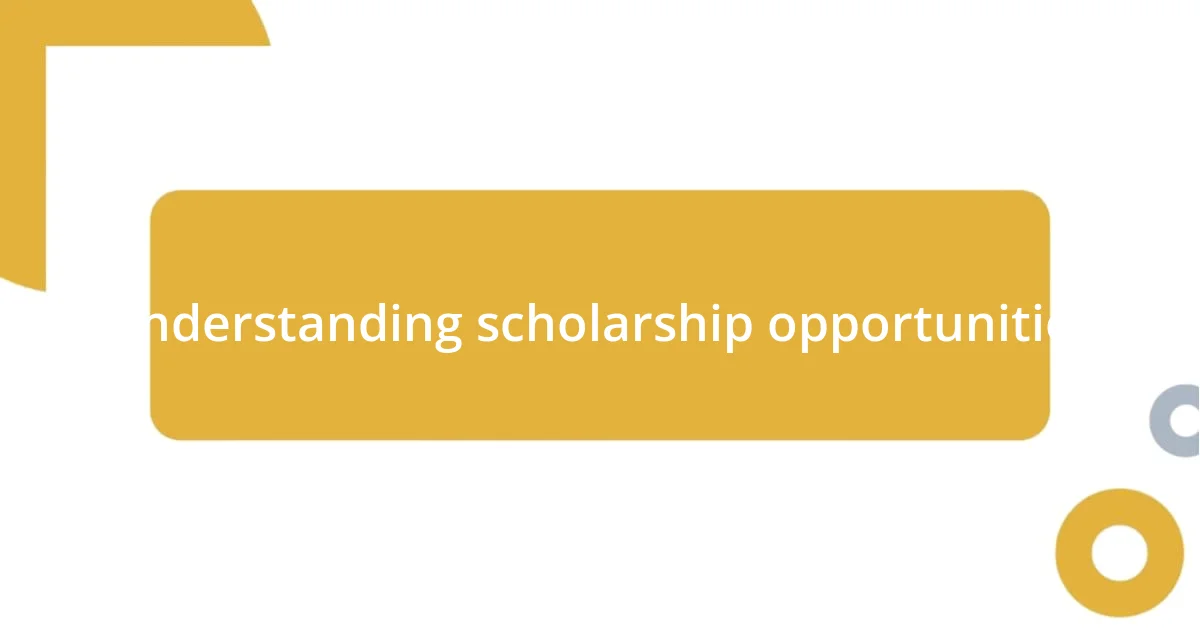
Understanding scholarship opportunities
When I first began exploring scholarship opportunities, I was overwhelmed by the sheer number available—all tailored for different backgrounds and aspirations. I remember feeling a mix of excitement and anxiety, wondering how I would find the right fit for my goals. The journey required careful research, but it also opened my eyes to the diverse ways funding could support my academic ambitions.
One thing I learned along the way is that scholarships aren’t just about financial aid; they can also provide a sense of belonging. I once applied for a scholarship specifically aimed at students from my community, and the application process connected me with mentors and peers who shared my experiences. Have you ever felt that sense of camaraderie when pursuing something meaningful? It’s powerful to realize that there are others out there rooting for your success, amplifying your potential beyond just monetary support.
As I delved deeper into the scholarship landscape, I discovered niche opportunities that resonated with my unique journey. I was surprised to find scholarships dedicated to my hobby of photography—an unexpected source of inspiration! This experience got me thinking: have you ever considered how your passions might translate into funding opportunities? It’s empowering to recognize that your interests can not only shape your educational path but also make it more accessible.
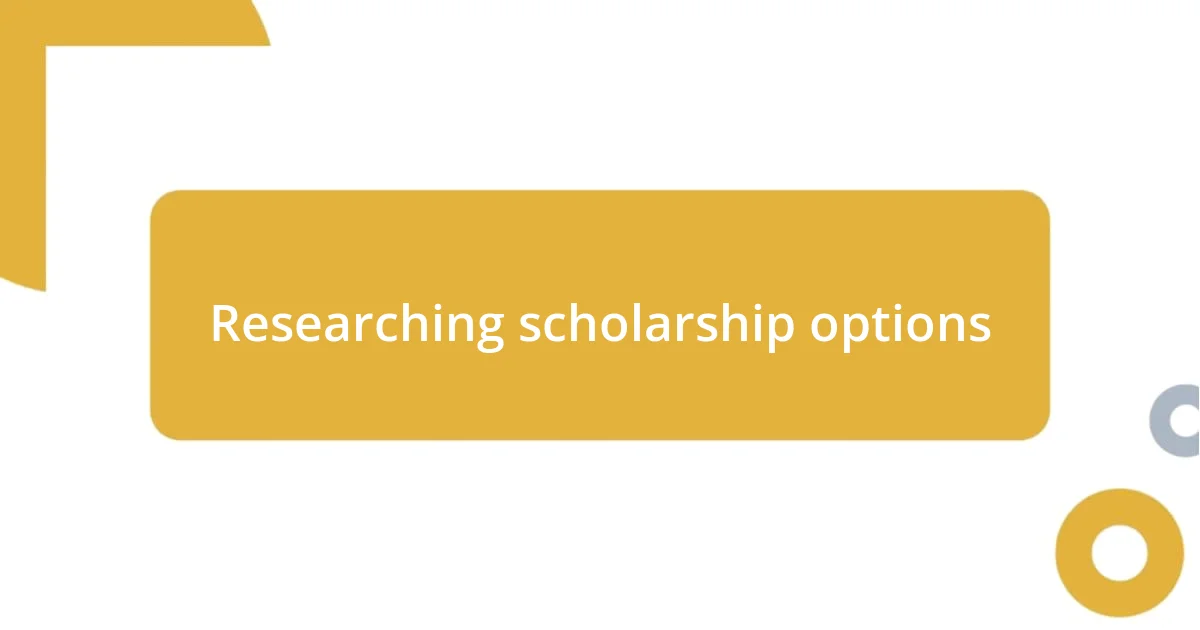
Researching scholarship options
When I started my scholarship research, I quickly learned that organization was key. I created a spreadsheet to keep track of the various scholarships I found, noting deadlines, eligibility requirements, and what made each one unique. I remember one evening, scrolling through listings and feeling a rush of hope as I stumbled upon a scholarship tailored to my academic major. It reminded me that persistence can uncover opportunities that resonate with our futures.
Here are some effective ways to streamline your research process:
- Identify Your Strengths: List your skills, interests, and background, which can help you pinpoint relevant scholarships.
- Use Multiple Resources: Explore websites, community boards, and university portals for a mixture of local and national scholarships.
- Join Online Forums or Groups: Engaging with peers can highlight lesser-known opportunities and provide support.
- Stay Organized: A simple spreadsheet can save you from becoming overwhelmed and help you track what you’ve applied for.
- Follow Up: Once you apply, don’t hesitate to reach out to organizations or previous recipients for advice or tips on the selection process.
Utilizing these strategies not only reduces the stress of searching but also empowers you to tailor your applications more effectively.
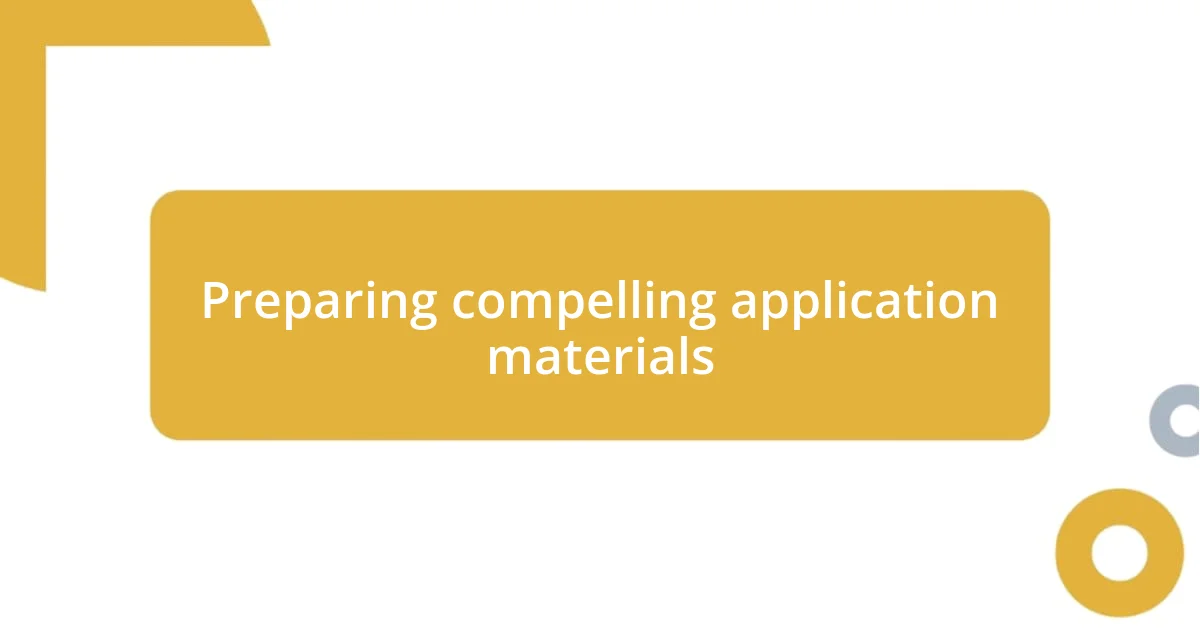
Preparing compelling application materials
As I worked on my scholarship applications, I quickly understood the importance of creating compelling materials to stand out. I remember sitting at my desk, rewriting my personal statement, trying to capture not just my achievements but also my genuine passion for my field. It was challenging, yet empowering, crafting a narrative that truly reflected who I was and what I aimed to achieve. Have you ever felt the pressure to make your story resonate? It’s all about translating your experiences into a compelling narrative, one that connects with the committee on a personal level.
Looking back, I realized that impactful recommendation letters can make a significant difference. I was fortunate enough to have mentors who not only knew my academic accomplishments but also understood my character and ambitions. I remember asking one of my professors for a recommendation, and after sharing my goals, he offered insights that I hadn’t considered before. Have you thought about what your recommenders can add to your story? Their perspectives can add depth and relevance to your application materials.
Each component of your application should be carefully tailored to highlight your unique story. I often revisited my essays after receiving feedback, making adjustments to ensure every word served a purpose. What I learned is that attention to detail can reveal your dedication. When the committee sees the effort you’ve put into your materials, it reflects not only your commitment but also your potential. And let’s be honest: we all want our hard work to pay off in the end!
| Application Material | Key Tip |
|---|---|
| Personal Statement | Craft a narrative that reflects your passions and aspirations. |
| Recommendation Letters | Choose recommenders who know both your achievements and character. |
| Essays | Revise multiple times and incorporate feedback to enhance clarity and depth. |
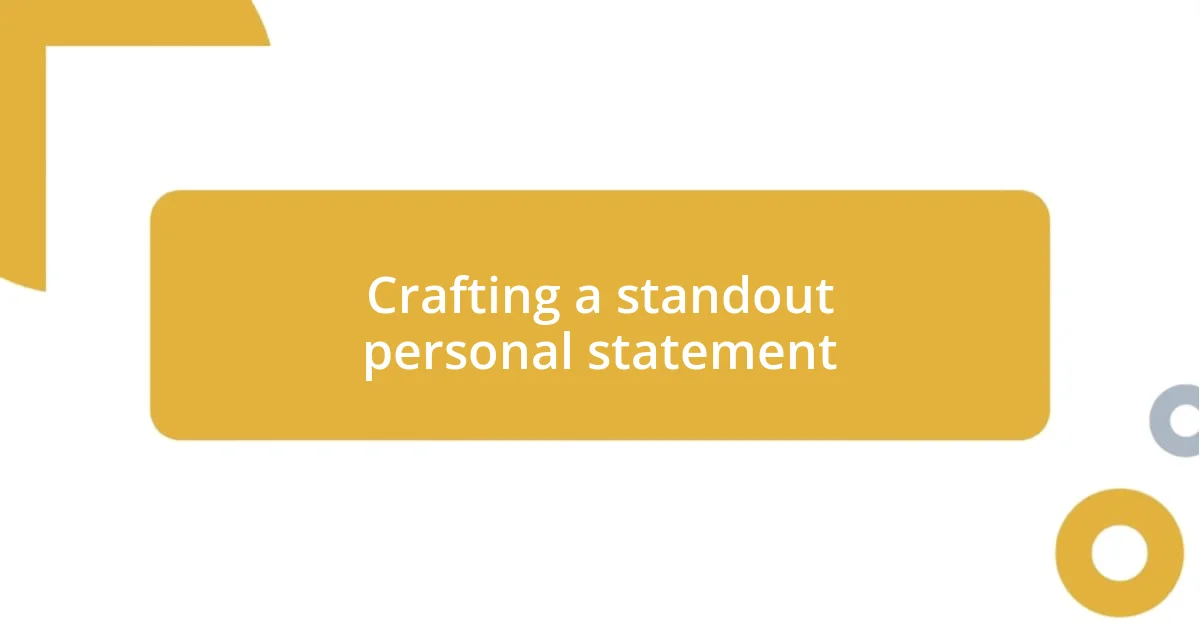
Crafting a standout personal statement
Crafting a personal statement is like painting a self-portrait with words. I remember grappling with how to present my journey authentically while still making it captivating. One day, surrounded by a sea of crumpled paper, I realized that my story isn’t just about achievements; it’s about the challenges I overcame. Have you ever thought about how your struggles have shaped who you are? Sharing those moments can forge a connection with the reader that mere accolades cannot.
As I delved into my narrative, I learned that vulnerability is a strength. When I explained how my experience volunteering at a local shelter opened my eyes to social issues, I felt a weight lift off my shoulders. That moment of honesty allowed my personality to shine through, making my statement not just a list of accomplishments but a reflection of my values. What emotions do you want to evoke in your reader? Consider how your experiences reflect not only what you want to achieve but also the person you’ve become along the way.
I also discovered that feedback is invaluable. A friend once read my draft and pointed out areas where I had downplayed my achievements. Her encouragement helped me strike a balance between humility and pride, an essential quality to convey in a personal statement. Have you asked someone to read your statement? Their fresh eyes can catch nuances you might miss. That extra polish can make all the difference, transforming your personal statement from good to truly standout.
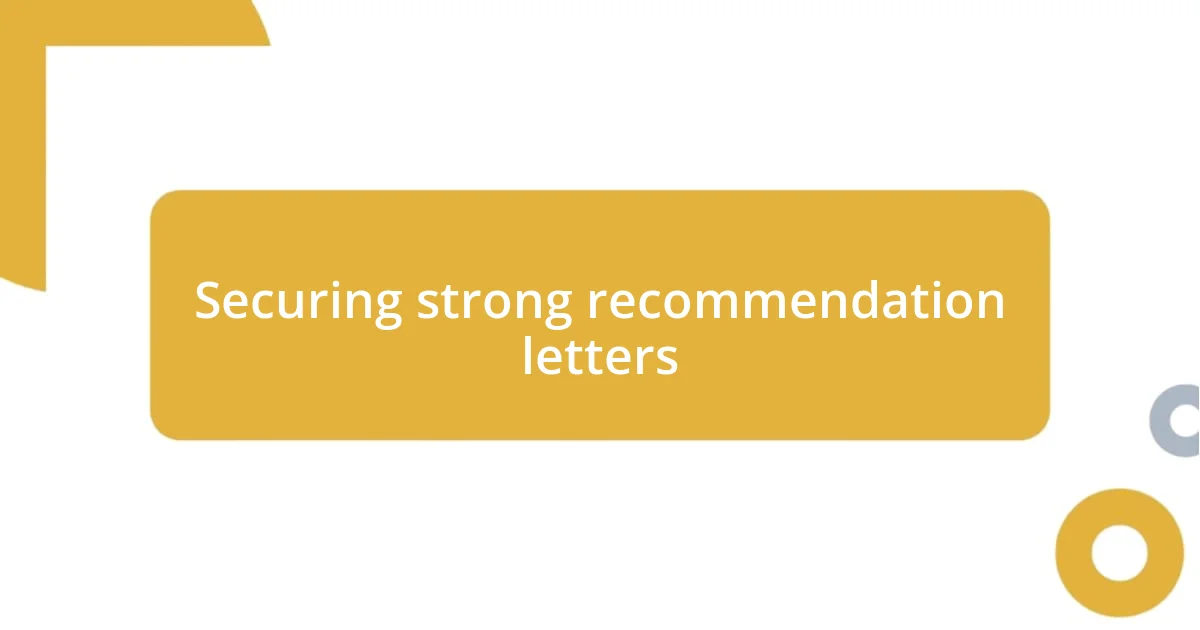
Securing strong recommendation letters
Securing strong recommendation letters requires both strategy and personal connections. I vividly remember choosing a high school teacher who had guided me through a difficult project. When I approached her for a recommendation, I made sure to explain my aspirations and the scholarship’s importance. I could see her eyes light up, and it made me realize that sharing my passion encouraged her to write a more heartfelt letter. Have you thought about how your recommenders might feel when they understand your goals?
Building relationships with potential recommenders ahead of time is crucial. I often took time after classes to chat with my advisor, discussing not only academics but also my interests and goals. This small investment in our relationship paid off when I asked for a letter; he was excited to share not just my grades, but my dedication and growth as a person. It’s astounding how personal connections can translate into stronger endorsements. Have you considered how much your recommenders could add if they know you beyond your resume?
Finally, I learned that crafting a thoughtful request can make all the difference. When I reached out to another professor, I wrote an email expressing my gratitude for his mentorship and included details about my future plans. I believe showing appreciation for their influence on your journey adds a personal touch that resonates. What do you think could happen if you approached your recommenders with genuine respect and appreciation? In my experience, that sentiment often inspires them to advocate for you with greater enthusiasm.
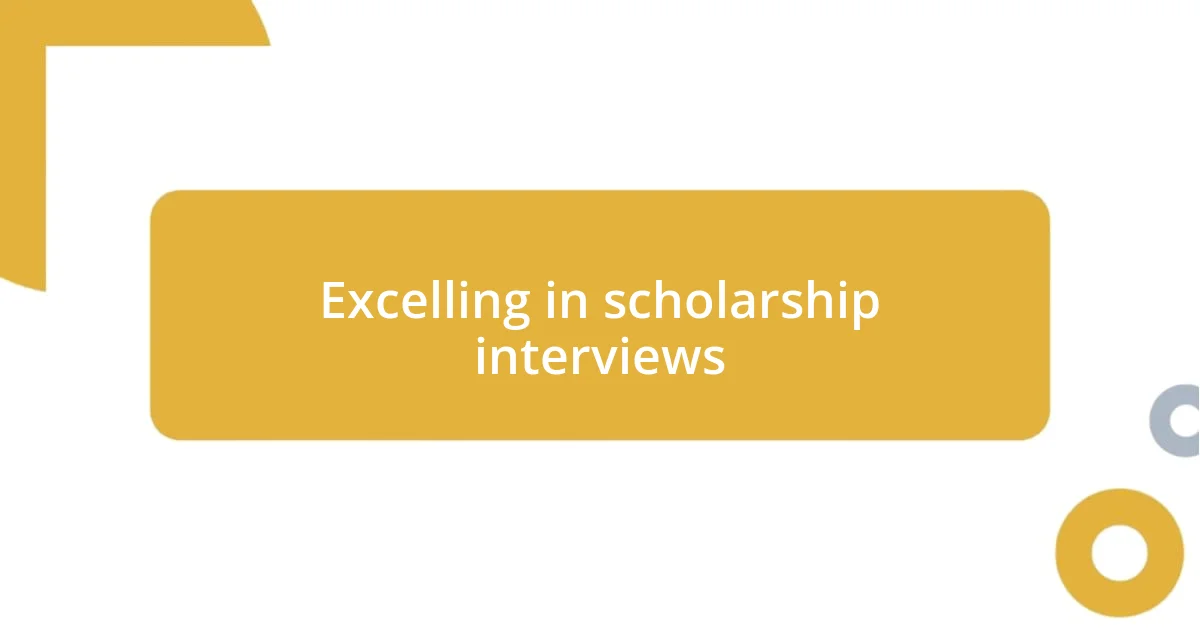
Excelling in scholarship interviews
Excelling in scholarship interviews can feel overwhelming at first, but I found that preparation turned nervous energy into confidence. I remember sitting in front of the mirror the night before my interview, practicing answers to common questions. It was surprising how articulating my thoughts helped me clarify my own motivations. Have you ever rehearsed a scenario so much that it felt more like a conversation than a checklist? That’s exactly what I aimed for.
During the interview itself, I realized the power of storytelling. When asked about my biggest challenge, instead of giving a textbook answer, I shared a relatable experience about balancing studies and part-time work. I noticed how the interviewers’ expressions changed; they were engaged, nodding along. This connection strengthened my message—authenticity often resonates more than polished perfection. What stories could you share that reveal your character?
Lastly, I learned the importance of asking questions at the end. I distinctly recall asking the panel about their own experiences with the scholarship. Their eyes lit up as they shared their journeys, creating a comfortable dialogue. It reminded me that interviews are a two-way street. Are you ready to make that personal connection? In my experience, showing genuine interest in the interviewers not only made me memorable but also built a bridge of rapport that transcended the usual formalities.
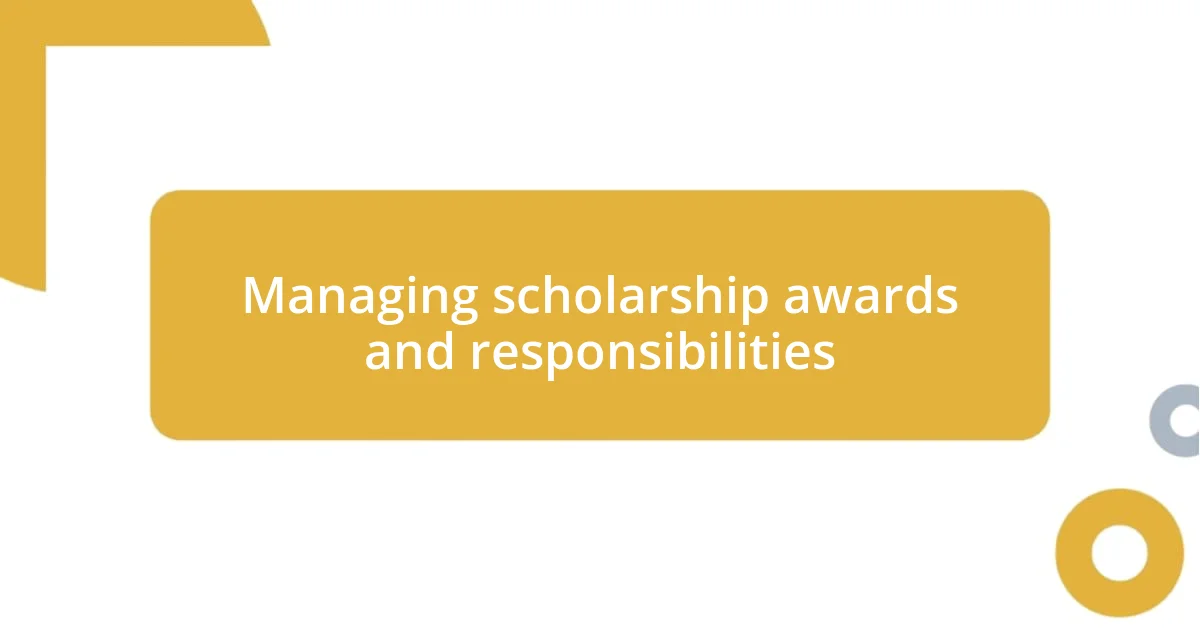
Managing scholarship awards and responsibilities
Managing scholarship awards isn’t just about receiving funding; it also involves meeting various responsibilities that come with it. When I received my first scholarship, I didn’t realize how crucial it was to track deadlines and maintain specific academic standards. Balancing academics while keeping tabs on scholarship obligations felt overwhelming at times, but I found that creating a simple calendar with reminders kept me organized. Have you ever considered how a straightforward tool like this can ease your stress during busy semesters?
In addition to academic performance, scholarship providers often expect students to engage in community service or leadership activities. I vividly remember volunteering at a local charity every month during my scholarship period. Not only did it enrich my personal growth, but it also fulfilled my scholarship requirements. The joy I felt from giving back made me reflect on the deeper purpose of education. How might your community engagement enhance your learning experience?
Additionally, I learned that communication is key. Regularly updating my scholarship committee about my progress helped foster a sense of trust and accountability. I remember sending a brief but heartfelt email after completing a major project, expressing gratitude for their support and sharing how it contributed to my academic journey. This proactive approach not only reinforced my commitment but also built a lasting connection with those who believed in me. Have you thought about how nurturing these relationships could impact your future opportunities?










